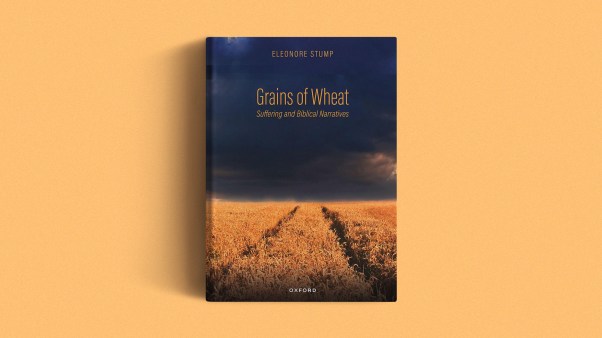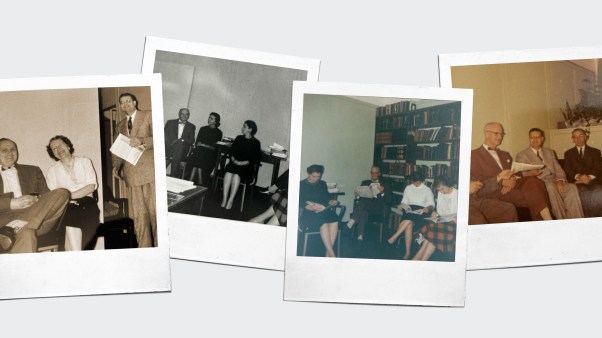 If you follow political news at all, by now you’ve probably heard of Julia, the character who made her debut recently on President Obama’s campaign website. The “Life of Julia” page documents this fictional woman’s life, from her entrance into the Head Start program at age 3, to her retirement and receiving of monthly Social Security benefits at age 67. Launched May 4, the chicly designed slideshow aims to demonstrate “how President Obama’s policies help one woman over her lifetime—and how Mitt Romney would change her story.” Thus, it’s stoked the ongoing national argument over the size, scope, and purpose of government.
If you follow political news at all, by now you’ve probably heard of Julia, the character who made her debut recently on President Obama’s campaign website. The “Life of Julia” page documents this fictional woman’s life, from her entrance into the Head Start program at age 3, to her retirement and receiving of monthly Social Security benefits at age 67. Launched May 4, the chicly designed slideshow aims to demonstrate “how President Obama’s policies help one woman over her lifetime—and how Mitt Romney would change her story.” Thus, it’s stoked the ongoing national argument over the size, scope, and purpose of government.
But there’s more to the story of Julia than that.
A careful look at her life story reveals just how thoroughly alone Julia is. Ross Douthat of The New York Times put his finger on it when he wrote, “… She seems to have no meaningful relationships apart from her bond with the Obama White House: no friends or siblings or extended family, no husband (‘Julia decides to have a child,’ is all the slideshow says), a son who disappears once school starts and parents who only matter because Obamacare grants her the privilege of staying on their health care plan until she’s 26.”
Well, so what? Julia is just a cartoon character, after all, and not a very well-developed one at that. If the woman doesn’t even have facial features, why bother giving her relationships?
Still, I submit that the perpetual isolation of Julia matters more than her designers might realize. She is, after all, supposed to represent the American woman. What does Julia’s aloneness tell us about how our government, and our society, sees us American women? Nothing good, I think. Certainly nothing realistic.
We might say that Julia goes to a certain extreme because there is simply no need to show the people in her life in this context. But the result is that Julia’s life is just a little too revealing about modern mores, especially when we see birth control but not a partner, and later a pregnancy (which she carefully “decides” upon, of course) but not a father. These foundational areas of Julia’s life are so completely in her own hands that, apparently, there is no one else qualified or permitted to make these decisions with her.
In fact, Julia demonstrates a certain erroneous view of women that has seeped into the culture: The strong, empowered woman is one who does everything by herself—even if that version of independence leads, paradoxically, to dependence on government. But how many of us really live like that? How many of us want to live like that?
Even—or perhaps especially—some of us single women may find Julia off-putting. I can honestly say that Julia’s life looks nothing like mine, and that’s not just because I’ve never been a Web designer or stayed on my parents’ health coverage until age 26.
I didn’t deliberately choose the single life, but I do choose to live in relationship with other people. I maintain strong ties with my parents, my sister, my grandmother, and various cousins. I go to church and sing in a choir with people of all ages and backgrounds. I spend time and energy cultivating friendships, and strive to be a good godmother to my best friend’s three children. I seek out older and wiser people for counsel and advice. At work, I ask for help from others when I need it, and offer my help in return.
I even participate in online communities with people I’ve never actually met in real life—a much-disputed kind of “relationship,” to be sure, but still a kind that lets me interact with other people. At least we can offer each other prayer, shared laughter in the good times, and emotional support through the bad times—solaces that Julia may never need in her conquering march through life, but ones that I depend on.
I need these people in my life, and (I humbly hope) at least a few of them need me. It may be unfashionable to say, but when I’m weak, their strengths carry me through. In practical, personal ways, their support for me reflects Christ’s ever-present support and love, and my need to rely on him. I would love, for instance, to muster the courage and confidence to drive myself through downtown D.C. But every time I have to ask someone for a ride, I’m reminded that I can’t—and shouldn’t—expect to make it through life by myself.
Douthat speculates that “in an increasingly atomized society, where communities and families are weaker than ever before, such a vision may have more appeal—to both genders—than many of the conservatives mocking the slideshow might like to believe.” Maybe that’s true for many, but that’s all the more reason that our society—especially Christians, who understand the importance of being part of a larger Body—should be working to build stronger families and communities. Because while Julia’s autonomous life may have its attractions, from where I sit, it also looks terribly lonely.
Or maybe you don’t. Nothing in my description yet would indicate that the idea is this is an anti-war film, a coda underscored twice in the film (by comparing former president Richard Nixon unfavorably to Charles Manson) and reiterated by the producer and director introducing the film by invoking the deaths of Canadian citizens in the Iraq war and suggesting the film was a valentine to America because it was about a time when it was okay to express dissent. Ummm….well…okay.
I’m sympathetic to just about every idea in Leslie, My Name is Evil, though I confess I often wanted them to work together better than they did. I like nachos. I like ice cream, I like curry. Just not in the same dish.
It’s hard to write succinctly about the film because there are a lot of things to talk about, some formal and some thematic. Like South Park (actually, a bit more like Team America), the film is deliberately transgressive, and so it is rather pointless to talk about whether it crossed some self-defined “line” separating the legitimately satirical from the grossly offensive. For me, I tend to care more about the perceived intention in being transgressive than I do about the exact nature of their envelope pushing. I imagine the scene that would most offend most Christian viewers (who might through some fluke find themselves in the audience unaware of what they are in for) would be a dream sequence in which protagonist Perry fantasizes about recreating a Manson ritual he has heard related in court with his naked, pious fiancee alternately lusted after and stabbed to death. That scene is so over-the-top in its stylization–and it, at least, has an underlying thematic point about repression which one may or may not agree with but can recognize–that I found it more subversive than obscene. Your mileage may vary.
Actually, the scene I had the most trouble with was the recreation of the actual murder. The victim, who was, you know, an actual historical person who really did suffer and really did die, is rendered faceless and identity-less, wrapped in an American flag so that the stabbing can have a more political than personal signification. A few years ago, I stumbled across a book that contained actual archival photographs of Jack the Ripper’s crime scenes and of the autopsies of his victims. Since then, I’ve had a real hard time with the commercialization of true crime. Even when works of art don’t glorify or romanticize the killers (and this one doesn’t–Leslie and Manson both are cuckoo for Cocoa Puffs) there still seems to me to be something about them that is exploitative in their co-opting of the suffering of others.
Which is a shame, maybe, because the film actually hits its mark as often as it misses. A scene in which the trial judge and district attorney discuss what euphemisms for copulation are acceptable for being said in court smartly underscores the seeming absurdity of straining at gnats while drowning in a sea of camels. There is a brief abortion back story that manages to be, somehow, both subversively pro-life and bitterly accusatory towards those who speak in terms of values but act in terms of self-interest (real or imagined). God’s answer to prayer and Perry’s obedience to (some of) the light that he has is one of those conclusions that can be read equally plausibly as sincere and mocking, thus encouraging viewers to think about why the implications are troublesome rather than simply being offended.
Early this week, the guy introducing Todd Solondz’s Life During Wartime said, “If the film disturbs you, [the director] is doing his job.” I’m not sure everyone will buy into the notion that this can be the primary purpose of film: I know I don’t buy that it is the only purpose. Leslie is a bit more cartoonish than, say, Welcome to the Dollhouse or Happiness, more prone to present its characters as absurd rather than petty, but I could totally picture director Reginald Harkema’s film playing as a double bill with Solondz’s and not suffering by the comparison.
Coming Soon: Festival wrap up and best bets.
Guest blogger Kenneth R. Morefield, an English prof at Campbell University, is writing about the Toronto International Film Festival for CT Movies.








